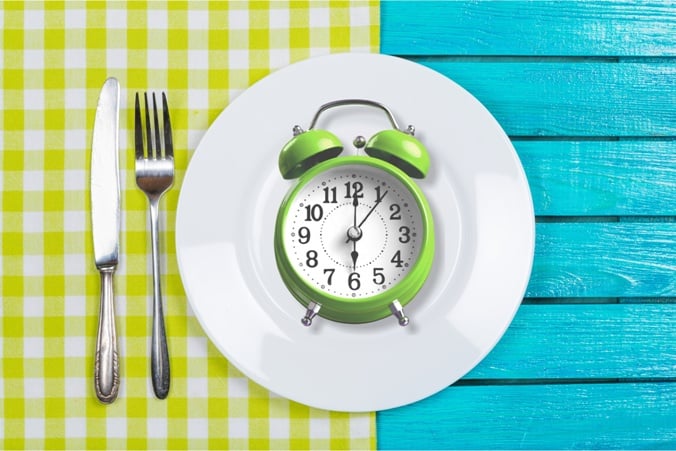
Many dietary fads come and go but intermittent fasting is here to stay. Humans have been using this eating technique for ages in virtually every major religion in the world for cleansing and purification purposes. The ancient Greek writer and historian, Plutarch, wrote, “Instead of using medicine, better fast today.” Unlike starvation, fasting is the voluntary withholding of food for health, spiritual or other reasons.
Today we know of the benefits of fasting beyond a cleanse. Fasting can improve insulin resistance and diabetes, lipid profiles, weight loss, brain function and cognition, as well as slow down the aging process.
Who should NOT fast?
Pregnant women, newborns and young children, those with prior eating disorders, type I diabetics (unless medially supervised), and severely underweight and malnourished individuals should not fast.
Types of fasting:
Researchers define fasting as the daily intake of less than 25% of ones total caloric needs. There is no exact way to fast. The following are options to consider.
|
TYPE OF FAST |
DESCRIPTION |
EXAMPLES |
|
Intermittent Fasting or Time Restricted Feeding |
Eating food within a certain time of the day. |
12 hour overnight simple fast: last meal at 7PM and the next meal at 7AM |
|
|
|
16/8 fast: last meal at 7PM and the next meal at 11AM with an 8 hour window of eating meals between 11am and 7pm |
|
|
|
24 hour fast: eating dinner at 7pm with the next meal being 7pm the following day |
|
Fasting Mimicking Diet (FMD) |
Using very low calorie (800-1000) prepared foods for 5 days |
Prolon ® FMD |
|
Extended Fasting |
Anything over 48 hours. Consume specific foods when you break this type of fast (see text) |
3, 5, or 7 day fasting with only certain liquids taken in |
You can decide to fast daily or every few days. Some people will do an extended 3-5 day fast monthly and maintain daily 16/8 fasts the rest of the month. Others may do a 24 hour fast during the work week and then eat 3 meals on the weekend.
During the feeding period, it is important not to restrict your calories. Remember, this is not a calorie based diet. Eat until you are comfortable. Of course, it is important that when you eat, you are focusing on high quality, non processed, non GMO, calorie dense foods with plenty of colorful vegetables.
Preparation for fasting:
Although everyone’s health circumstances are different, here are some general recommendations to implement in preparation for your fast. If you are starting with an overnight simple fast, you can just go for it. Otherwise, consider:
- Limiting your carbohydrate dense foods so you can help your body become metabolically flexible (the bodies preference for burning fat over glucose). This includes:
- Starches such as bread, cereal and pasta
- Milk, yogurt and ice cream
- Sweets, candy and soda
- Taking a high quality multivitamin/multi mineral supplement.
- Limiting your liquid calories making sure you have herbal tea, bone broth, black coffee +/- MCT oil and filtered water to be consumed during the fast.
- Lowering your overall stress.
Tips for success during your fast:
Remember to stay well hydrated with non caloric beverages (listed above). You can add Himalayan salt to your water or bone broth if you start to feel a little dizzy as your body may need the minerals.
Add Magnesium or Epson salt baths if you start to have muscle cramps or constipation.
If constipation develops, you can increase your fluid intake; add higher fiber meals, aloe vera, and smooth move teas.
The more you train your body to fast and become metabolically flexible the less hunger you will develop. In the beginning however, you may need to employ lifestyle strategies to deal with this sensation. Hunger comes in waves so try and ride it out by drinking more fluids and keeping your mind busy. The best time to begin your fast may be during a busy work day when you would not likely eat anyway.
Also ask yourself, “Am I hungry or just stressed and want to eat to cope?”. If the answer is the latter, try deep breathing, aromatherapy, or mindfulness techniques. Better yet, go out and get some fresh air and do some grounding. These techniques can increase your “feel good” hormones to help you cope with the stress.
Try to avoid the kitchen, especially when you begin to fast.
Eating around 6 pm will allow you to beat the rise in the hunger hormone, ghrelin. Ghrelin tends to spike in the evening so try and have a meal to suppress its production and thereby limit the desire for nighttime grazing.
Add medium chain triglycerides (MCT) oil to your AM coffee which may create a more comfortable fast.
And finally, if you find yourself having difficulty during your fast, STOP the fast and eat something. Grab a handful of almonds or proceed with your meal. If you are doing an extended fast more than 3 days, break the fast gradually with broths and soups. After a few days, add low carb smoothies and light meals before incorporating your full meals again.
As fasting is a lifestyle, it is important to fit fasting into your life and not vice versa. Think about where and when it makes sense. There is no one way to fast. Make it work for you and enjoy the health benefits. And by the way, it’s FREE!
 Dr. Denia Tapscott, M.D., is board certified in internal medicine and provides personalized treatment with a functional medicine approach to get to the root cause of issues and begin the journey towards wellness. Her areas of interest include: Functional Medicine, Adult Holistic Primary Care, Obesity Medicine and Weight Loss, Cardiovascular Disease, Diabetes Prevention & Metabolic Syndrome, Executive "functional" physicals, Chronic Disease Management, Pre and Post Bariatric Surgery Care and Diet and Lifestyle focused care.
Dr. Denia Tapscott, M.D., is board certified in internal medicine and provides personalized treatment with a functional medicine approach to get to the root cause of issues and begin the journey towards wellness. Her areas of interest include: Functional Medicine, Adult Holistic Primary Care, Obesity Medicine and Weight Loss, Cardiovascular Disease, Diabetes Prevention & Metabolic Syndrome, Executive "functional" physicals, Chronic Disease Management, Pre and Post Bariatric Surgery Care and Diet and Lifestyle focused care.
.png?width=305&height=132&name=NIHAlogoBLUE_3_transparent%20(2).png)

